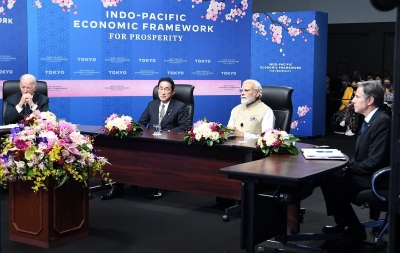India, Australia renew their commitment to strengthen cooperation in multilateral fora
Prime Minister Narendra Modi and his Australian counterpart Anthony Albanese renewed their commitment to strengthening cooperation in the multilateral fora.
Prime Minister Narendra Modi hails the initiative as a declaration of a collective desire to make the Indo-Pacific region an engine of global economic growth.

On the eve of the Quad Summit, US President Biden on Monday launched an ambitious Indo-Pacific Economic Framework for Prosperity (IPEF) with Prime Minister Narendra Modi describing the initiative as the declaration of a collective desire to make the Indo-Pacific region an engine of global economic growth.
Modi expressed India’s commitment to working with all Indo-Pacific countries for an IPEF which was both inclusive and flexible. He stressed that the foundation of resilient supply chains must be the 3T’s – Trust, Transparency, and Timeliness.
Advertisement
The IPEF was launched at a ceremony in Tokyo attended by President Biden, Japanese Prime Minister Fumio Kishida, and PM Modi and virtually attended by the leaders of other partner countries viz. Australia, Brunei, Indonesia, South Korea, Malaysia, New Zealand, the Philippines, Singapore, Thailand, and Vietnam. The 13 countries together represent 40 percent of the world’s GDP. Beijing has already slammed the Biden administration’s framing of IPEF as a tool to counter China’s regional clout.
Advertisement
In his comments during the launch ceremony, Modi noted that India has historically been at the centre of trade flows in the Indo-Pacific region, having the world’s oldest commercial port in Lothal, Gujarat. He called for finding common and creative solutions to tackle the economic challenges of the Indo-Pacific region.
”India is committed to a free, open, and inclusive Indo-Pacific region and believes that deepening economic engagement among partners is crucial for continued growth, peace, and prosperity,” he said.
The Prime Minister further said that India was keen to collaborate with partner countries under the IPEF and work towards advancing regional economic connectivity, integration and boosting trade and investment within the region. ”With the launch of the process today to establish the IPEF, partner countries will begin discussions focusing on strengthening economic cooperation and achieving shared goals,” he added.
A joint statement issued by the participating nations said the IPEF seeks to strengthen economic partnership amongst participating countries with the objective of enhancing resilience, sustainability, inclusiveness, economic growth, fairness, and competitiveness in the Indo-Pacific region.
The IPEF is expected to strengthen ties among the participating nations to define the coming decades for technological innovation and the global economy. It is likely to create a stronger, fairer, more resilient economy for families, workers, and businesses in the Indo-Pacific region.
Tackling inflation is a top economic priority, and the IPEF will help lower costs by making supply chains more resilient in the long term, protecting member nations against costly disruptions that lead to higher prices for consumers.
With 60 percent of the world’s population, the Indo‑Pacific is projected to be the largest contributor to global growth over the next 30 years.
The IPEF was launched a day before the leaders of the US, India, Japan, and Australia hold the Quad Summit that will provide them an opportunity to review the progress of Quad initiatives.
Advertisement